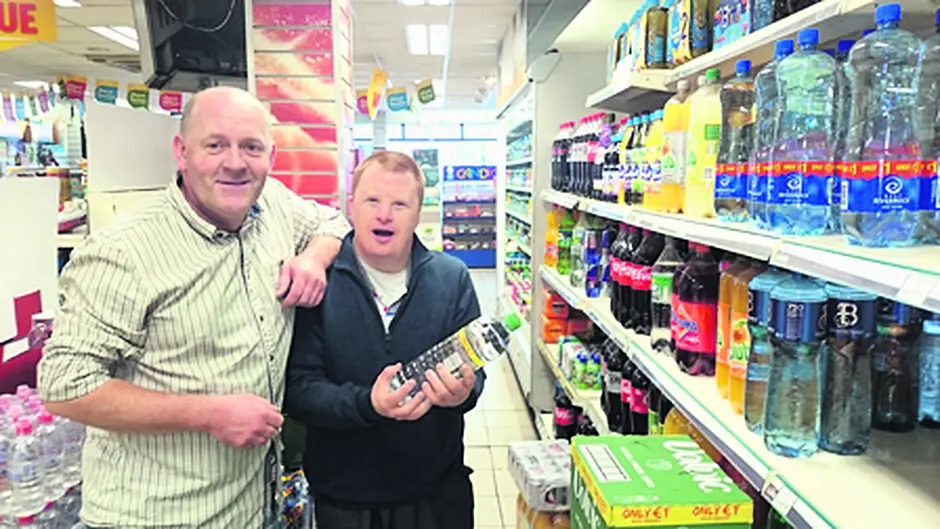CoAction's supported employment programme has benefits for employee and employer.
‘For some people going to work is the most important part of the week.’
Gemma Casey is talking about the 14 people with a disability who have been taking part in CoAction’s supported employment programme in Clonakilty for the last three years.
Gemma is but one of five job coaches employed by CoAction to provide supported employment for 83 people in 123 jobs that have been provided by 126 West Cork employers.
Caroline O’Shea is the jobs coach in Skibbereen; Rosie Murphy works in Castletownbere; and Rose O’Leary and Ann Hurley are the job coaches in Bantry and Dunmanway.
Steve Jobs once said: ‘The only way to do great work is to love what you do.’
Caroline said she enjoys her job, but the real satisfaction comes from the joy and the sense of belonging that the 19 people she affectionately calls ‘the lads’ get from being a part of the labour force.
‘Most of us struggle to keep one job going, but Dermot and many of his friends in CoAction hold down two or more jobs,’ she said.
On a Monday, Dermot works in the HSE, where he shreds all the unwanted paper from the various offices and on Thursday morning it is off to The Southern Star office to collate the newspapers for national and international distribution.
‘His dedication to his work and indeed that of all of our lads is second to none and the employers of West Cork should be commended for giving them the chance to prove themselves as part of the paid workforce.
‘Through their work they have the opportunity to find their place in the community – a place that had, in the past, had been denied to them.’
Dermot (60), who is visually impaired and has a mild learning disability, was interviewed at his place of employment last Thursday and this is what he had to say: ‘It is wonderful to be working with Caroline – I would do anything for her.’
It is a genuine sentiment, and one that also applies to his co-workers in the front office, namely: Anne Breen, Anne Kelleher, Marie Twomey, Peggy Collins, Eibhlin Crowley and Jennifer Barron.
Dermot said he likes paid employment because it gives him focus for the week and it is on a par with independent living, a home of his own.
His days and his weeks have structure: he takes daily walks and enjoys listening to his CDs, and is happy to be looking forward to hearing Christy Moore, one of his favourites, in Glengarriff at the end of this month.
Anne Kelleher in The Southern Star said: ‘We love having Dermot working here every week.’ It is a genuine response, one that is shared by everyone in the office, as well as other local employers.
Donal O’Driscoll, the manager of Skibbereen Credit Union said he is honoured to have Julie working for them every Friday. He said: ‘Julie keeps us all grounded.’ And at CH Marine, Finbarr Connolly, spoke of Noel in glowing terms saying: ‘We enjoy Noel’s company and appreciate the work he does.’ Nollaig Harte of Harte’s Catering, which is based in Cork Marts, has this to say of their employee: ‘William is more than an employee, he is our friend.’
In Castletownbere, Rosie Murphy said: ‘I would like to sincerely thank all the businesses in Beara who employ and support our lads, and we hope to continue to increase the number of these employment positions in the future.’
Colman, who works in Castletownbere library every Friday for two hours, spoke with evident delight of the time he spends working with Dorothy, the librarian: ‘I tidy the books on the shelves and put away books,’ said Colman, who has been working there for 19 years. ‘I love my job here as I get to meet loads of people from the community and I have made loads of friends in that time.’
Rose O’Leary and Ann Hurley work together to provide the programme in Bantry and more recently Dunmanway. Rose explained that supported employment is based on the principle that ‘everyone can and has a right to work. As a model, supported employment recognises the importance of having a valued and meaningful role within society.’
The supported employment model first emerged in the US in the mid-1970s. In Ireland, a handful of disability organisations quickly recognised the huge merits of providing a supported employment programme to people availing of their services.
CoAction was among these and in the early 1990s employed its first job coach, Kathleen O’Sullivan, to work with interested persons within the service and local employers in the Bantry area.
The hard work, enthusiasm and energy of those initial job seekers, the openness and willingness of their employers, and the ongoing support and mentoring provided by the job coach paid dividends.
Today, CoAction’s programme extends beyond Bantry to include Castletownbere, Dunmanway, Clonakilty and Skibbereen. The CoAction programme works because of the uniqueness of the individual job seekers, on the job mentoring and training, as well as the provision of the appropriate support framework.
Of course, were it not for local employers none of this would be possible. Rose O’Leary said: ‘Each employer is unique and the range of jobs they offer reflect the individual choice of their employees.’
Ann Hurley also noted that today there are people working in a range of diverse employments including hotels, cafes, officers, libraries, garages, supermarkets, tool hire, marine, food processing, bars, hairdressers, nursing homes, private home, newspaper offices, the HSE and Cork County Council.
A recent gathering of programme employers in Bantry promoted one businessperson to comment: ‘I had no idea of the size or scale of the programme and just how many people benefit from it.’
It is evident that supported employment provides the employee with an income, increased independence, new friends, new learning experiences and it offers them a valued role within their community. But there is more to it than that: It creates new opportunities for all those involved. It is not based on benevolence, but rather on ability, respect and diversity.
<









